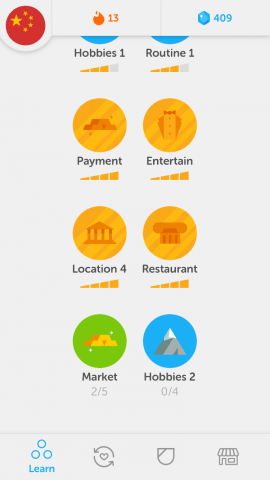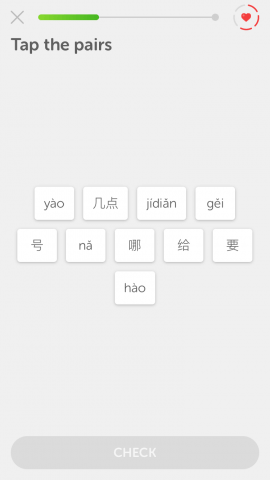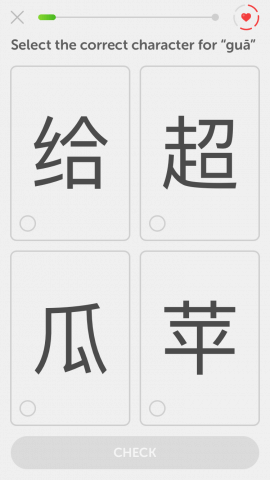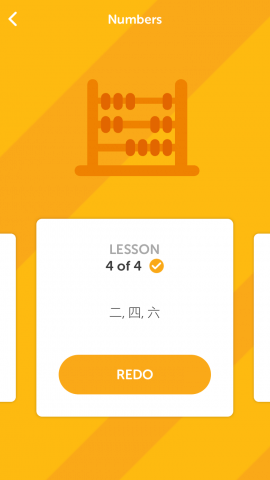Duolingo for Mandarin 🦉 Is It Really Any Good?
An Honest Duolingo Chinese Review 🧐 Should I Download Duo for Chinese?
8.5/10 || Duolingo is a fun and accessible app for beginners to intermediate speakers who need the motivation to learn a language and don’t have that much time. More serious learners may find Duolingo a tad slow and it has its limitations. It won’t take you to language fluency, and there is a limit to how much you can learn.
In our never-ending quest for the best Chinese learning apps, our journey takes us to our Duolingo review.
One of the biggest names around in language learning.
With most of the other apps we’ve reviewed, they specifically teach Chinese. Or they are social media apps we recommend in China that can switch between only English and Chinese.
Duolingo, on the other hand, has a huge range of languages to use. As with most things, with quantity comes a lack of quality – we wanted to find out if that’s the same for Duolingo, too.
So we delve into the Chinese version and see if it’s worth the download or not – so you don’t have to waste your time trying to find out!
The Duolingo review below is pretty comprehensive. Feel free to skip to the chapters most useful to you in the table below.
Duolingo Review // Key Stats, Price, & App Comparisons
Duolingo Review // Pros & Cons
Duolingo Review // Introduction; What Is It?
Duolingo Review // Topics Covered (Mandarin)
Duolingo Review // A Typical Lesson
Duolingo Review // Duolingo Pros
Duolingo Review // Duolingo Improvements?
Duolingo Review // Can it Lead to Fluency?
Duolingo Review // Other Languages Offered
Duolingo Review // The Conclusion; Yay or Nay?
Duolingo Review // FAQs
Duolingo Review Chinese // Key Stats, Price, & App Comparisons
Duolingo Key Stats
| Name | Duolingo |
| Description | “With our free mobile app or web and a few minutes a day, everyone can Duolingo. Learn 30+ languages online with bite-size lessons based on science.” (Duolingo) |
| Website | https://www.duolingo.com/ |
| No. of Languages Offered | 30+ |
| Price | Free / $7 per month |
Duolingo Premium
You can get most of Duolingo’s content for free (thanks Duo!).
But for unrestricted usage, you can consider the subscription.
| Duolingo Subscription | Price (USD$) |
|---|---|
| Monthly | $7 |
| Annual | $84 |
Duolingo App Comparisons
(Other popular Chinese language learning apps)
| Language Learning App | Monthly | Annually | Lifetime |
|---|---|---|---|
| Memrise | $8.49 | $59.99 | $119.99 |
| Mondly | $9.49 | $39.99 | $89.99 |
| Drops App (includes Scripts by Drops) | $14.49 | $142.99 (annually for two years) | $174.99 |
| Italki | N/A (pay per lesson) | N/A (pay per lesson) | N/A (pay per lesson) |
| Duolingo | $7 | $84 | N/A |
| HelloTalk | $6.99 | $45.99 | $175.00 |
| Busuu | from $9.99 | from $69.96 | N/A |
Duolingo Review Chinese // Duolingo Chinese Pros and Cons
| Duolingo Pros | Duolingo Cons |
|---|---|
| It’s free! | Health feature limitations |
| Simple, clean design and nice user interface | Nothing about tones |
| Weakest words feature; a smart feature that allows you to target the words you perform less well with. | Limited content for upper intermediate/advanced users |
| Motivational, fun, and personalised notifications | Limited explanations on some more complicated / language-specific nuances |
| Sentence Building aspects (not just vocabulary) | Limited prospect of fluency |
Duolingo is a fun, cool, and modern app that helps you to learn a language in a very accessible way. But it may not be the best for more serious language learners, and certainly won’t get you to fluency.
Duolingo Review // What’s Duolingo All About?

Duolingo’s user interface and design are simple and effective. The app contains a list of topics which progressively get harder.
Start at the top and work your down to the bottom when, hopefully, you’ll have made a vast improvement.
THE ASSESSMENT
A feature I immediately took to was the “assessment” that I undertook when first playing with the app.
I downloaded the app with a basic-intermediate level of Chinese so I didn’t want to go back to the start and waste time on the simple stuff.
However, with the long list of “lessons” I’d have had no idea where to start.
The “assessment” placed me at a level it thought fit and their choice was pretty accurate.
The first few lessons were a little easy, but all good to review. Then, soon enough I came across a wealth of new characters and sentence structures without wasting too much time. A good feature in my eyes.
Duolingo Review // What Topics are Covered? (Chinese)
The categories are split into the typical day-to-day things you’d go about or talk about.
This is really great since they’re actually topics you’d want to be talking about. The worse when learning a language is learning things you’d never use…
(Although, you should note that Duolingo’s interesting choice of some sentences means that some of them, whilst grammatically correct, are non-sensical. You might love or hate this about the app, but either way, some are pretty funny!)
On Duolingo, you’ll find topics such as;
- Work
- Entertainment
- Food
- Family
- Going Shopping
Etc!
It’s all covered and each section gets progressively harder as you move forward.
Duolingo Review // A Typical Duolingo Lesson
Lessons can last anything between 5 and 15 minutes roughly, depending on how you are getting to grips with the characters and structures.
They are split into numerous different activities.
Typically you’d start by learning 3 or 4 relevant characters with their respective pinyin and then you’d have to match 5 pairs of characters with the pinyin which I find quite fun.
Once becoming familiar with the character, you then move on to the sentences themselves. Here you are either given a sentence in English or Chinese.
Your job then is to create the sentence in the other language.
It’s useful because it works both ways and not just one way. You get the chance to decode Chinese into English, but also create a sentence in Chinese after reading the English.

When studying you must note your “health“.
You get a set number of lives. If you run out, you have to wait or use any spare “coins” you’ve built up to buy back full health.
You lose health for each question you get wrong.
Two things I’d like to see improved with Duolingo when involved in a lesson:
- Health, don’t punish learners – I see what Duolingo is doing with health but I can’t help but feel it punishes people for getting things wrong.
It almost installs a fear of failure.
No one should have that when learning a language. You are supposed to make mistakes, you are told to make mistakes, then learn from them.
If I lose my final bit of health I have to close the app and wait a few hours. By then I’ve forgotten where or why I went wrong. Language learners shouldn’t be punished.
2. Explain the new characters – When I learn a new character, it’s a great feeling!
Another one ticked off! However, Duolingo doesn’t actually tell us what the new character means.
We get the pinyin and the character, but before we actually know the meaning we are given a sentence. I think the idea is to make you give an “educated guess” when the sentences arrive.
However, I believe the learning experience would increase if we just had the definition of each character explained.
Duolingo Review // What’s Great About Duolingo For Learning Chinese?
There are a number of things Duolingo does very well that makes it stand out as an app for learning Mandarin.
Here are a few of my favourites:

- Simple interface – Getting around Duolingo is very easy. The look and feel of the app are fresh, the navigation is convenient and it effectively uses the “less is more” elements of design.
- Sentence structure – An important part of learning Chinese. Many apps teach vocabulary but not sentence building. The app drills home various structures until you become absolutely happy with how to build various sentences.
- Weakest words – This is a smart feature that allows you to target the words you perform less well with. The way to succeed with any language is practice, so to target the words you struggle with more is a great idea and one I find effective. Sometimes I feel the weaker words aren’t wholly accurate but in general, it picks up well where I might perform less well.
- Variety of Topics – From Shopping to Sports, Time to transport, it’s all covered. Duolingo covers pretty much everything you need in day-to-day life in China. I also particularly like the look of the Net Slang section (I haven’t quite reached it yet). This is a very clever addition in my opinion, in the day and age of social media and platforms to share content. Net slang is rife so to be able to learn these is a shrewd move.
Duolingo Review // Can Duolingo Lead to Fluency?
You can certainly learn Chinese very well and to a certain extent, but ultimately it depends on your end goal. And I don’t think you can use any platform solely to get you to language fluency.
The speaking side of Duolingo is a little more unnatural, the voices are a little robotic and not native speaking. Character recognition, words and sentence structure on the other hand are very well covered.
I think it’ll give you a good basis but getting out there and speaking is something that you cannot avoid.
However, one of my favourite parts of Duolingo is its motivational techniques. They really press home the “streak” (how many days can you study in a row) and it’s really working for me.
Normally I study early in the day but if I’ve a busy morning and no chance to study Duolingo will drop me a little notification, nothing too intrusive, just to nudge me to get my days work in.
Likewise, they’d also drop an email congratulating you on your progress and willing you on further.
Although it’s clearly automated and mass-produced it really still held a personal feel to it.
I’d be confident in saying without the emails and notifications, my current two-month-long streak would not be the same.

500+ Chinese Vocabulary 📚Your Complete List
Chinese Vocabulary: Food, Shopping, Colors, Numbers, Sports and MORE! Learn from over 50 categories of Chinese Vocabulary to get by in China.
Duolingo Review // How Can Duolingo Improve?
No one is perfect, right?
As much as I enjoy using Duolingo, if they could implement the following, I think it wouldn’t be far off the complete app for learning Chinese:

- Tell us the meaning of the character – For beginners, this applies more so. With my level of Chinese I can second guess many of the characters after knowing the pinyin but for a beginner to be faced with a character, and then be thrown straight into a translation question is a little unreasonable. How will the user know what the new character means?
- Don’t punish us – I see the idea with the Health bars as mentioned above but learners shouldn’t be punished. Simple as that.
- More focus on Tones – Again, for me this hasn’t been an issue but for beginners, it will be. Tones are absolutely essential when learning Chinese and are the first thing the LTL teachers will teach you. Duolingo avoids teaching this. Some early exercises on recognising tones would go a long way to helping Chinese users when using Duolingo.
- Unnatural voices – As mentioned above, when sentences or words with more than one character are read, everything sounds a little like Microsoft Sam. Some native speakers and sentences that actually flow would be nice.
Duolingo Review // Other Languages Offered
Duolingo Languages
In this review, we concentrated on our learning Chinese on Duolingo experiences. But what other languages does Duolingo offer?
- English
- Arabic
- Bengali
- Czech
- Dutch
- Filipino
- French
- German
- Greek
- Hindi
- Hungarian
- Indonesian
- Italian
- Japanese
- Korean
- Polish
- Portuguese
- Romanian
- Russian
- Simplified Chinese
- Spanish
- Thai
- Traditional Chinese
- Turkish
- Ukrainian
- Vietnamese
Other
Duolingo has expanded from languages recently and also has an app for learning ABCs as well as Maths!
Duolingo Review // Duolingo for Chinese – Conclusion!!!
Using Duolingo to learn Chinese; yay or nay?
For me, it’s a YAY. Duolingo digs deep by providing you with a host of topics, builds your confidence with sentences and increases your vocabulary and Hanzi all at the same time.
Despite the small number of things to improve, there’s no doubt Duolingo is one of the better Chinese learning apps there is.
The fact it covers a load of languages mean if you get on with the app, it’s easy to get stuck into another one once you’ve “got the bug”.
What do you think of Duolingo? Why not tell us in the comments below?
Duolingo Review || FAQs
Can I learn Chinese on Duolingo?
Yes. Duolingo supports many languages, and Mandarin is indeed one of them.
Is Duolingo good for learning Chinese?
For beginner to intermediate level there’s no doubt Duolingo is one of the better Chinese learning apps there is.
Can I download Duolingo on my phone?
Yes Duolingo is available on your iPhone App Store.
What are some other good apps to learn Chinese?
There are so many on the market now, but here are some, with links to our reviews on them:
Want more from LTL?
Want to learn Chinese from the comfort of your own home? Then our 24/7 online Chinese lessons might be the thing for you.
We offer a 7 day free trial to all new online students where you can study Mandarin 24/7.
Come and check it out free of charge and see what you think!
If you wish to hear more from LTL Language School why not join our mailing list?

















 Hi, my name is Manuel! I am from Spain and I am a Student Advisor at LTL and I’m based at our Taipei school.
Hi, my name is Manuel! I am from Spain and I am a Student Advisor at LTL and I’m based at our Taipei school. Hi, my name is Mojca! I am from Slovenia in Europe and I work as a student advisor at our Shanghai school.
Hi, my name is Mojca! I am from Slovenia in Europe and I work as a student advisor at our Shanghai school.


4 comments
[…] Every little bit of Chinese helps and luckily for you we have a host of apps to recommend. Our favourite Chinese learning apps are featured in our blog. We rate and review them. Included are Duolingo, Skritter and Chineasy. […]
[…] Duolingo, Lingodeer, Drops, Super Chinese o qualsiasi altra, ti faranno tutte iniziare con l’apprendimento dei toni. […]
overrated and not good for advanced learners
👌